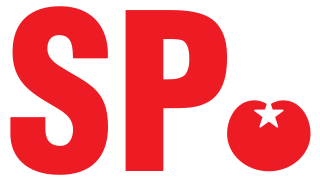The Labour Party is a social democratic political party in the Netherlands.

The politics of the Netherlands take place within the framework of a parliamentary representative democracy, a constitutional monarchy and a decentralised unitary state. The Netherlands is described as a consociational state. Dutch politics and governance are characterised by a common striving for broad consensus on important issues, within both of the political community and society as a whole.
The Christian Union is a Christian democratic political party in the Netherlands. The CU holds socially conservative positions on issues such as same-sex marriage, abortion and euthanasia, is Eurosceptic, while maintaining progressive stances on economic, immigration and environmental issues. The party self-describes itself as "social Christian".

The Christian Democratic Appeal is a Christian-democratic political party in the Netherlands. The CDA was originally formed in 1977 from a confederation of the Catholic People's Party, the Anti-Revolutionary Party and the Christian Historical Union, and has participated in all but three governments since then. Sybrand van Haersma Buma has been the Leader of the Christian Democratic Appeal since 18 May 2012.

Democrats 66 is a social-liberal political party in the Netherlands. Its name originates from the year in which it was founded.

The Catholic People's Party was a Catholic Christian democratic political party in the Netherlands. The party was founded in 1945 as a continuation of the Roman Catholic State Party, which was a continuation of the General League of Roman Catholic Caucuses. During its entire existence, the party was in government. In 1980 the party merged with the Anti-Revolutionary Party (ARP) and the Christian Historical Union (CHU) to form the Christian Democratic Appeal (CDA).

Elections in the Netherlands are held for five territorial levels of government: the European Union, the state, the twelve Provinces, the 25 water boards and the 380 municipalities. Apart from elections, referenda are also held occasionally, a fairly recent phenomenon in Dutch politics. The most recent national election results and an overview of the resulting seat assignments and coalitions since World War II are shown at the bottom of this page.

The Political Party of Radicals was a progressive Christian and green political party in the Netherlands. The PPR played a relatively small role in Dutch politics and merged with other left-wing parties to form GreenLeft in 1991.

General elections were held in the Netherlands on 22 November 2006 following the fall of the Second Balkenende cabinet. The elections proved relatively successful for the governing Christian Democratic Appeal (CDA) which remained the largest party with 41 seats, a loss of only three seats. The largest increase in seats was for the Socialist Party (SP), which went from nine to 25 seats. The main opposition party, the social-democratic Labour Party (PvdA) lost nine of its 42 seats, while the right-liberal People's Party for Freedom and Democracy (VVD) and the progressive liberal Democrats 66 lost a considerable portion of their seats, six of 28 and three of six, respectively. New parties, such as the right-wing Party for Freedom (PVV) of former VVD MP Geert Wilders and the animal rights party Party for the Animals (PvdD) were also successful, with the PVV winning nine seats and the PvdD winning two, thereby becoming the first animal rights group to enter a European parliament.

The Dutch municipal elections of 2006 were held on March 7, 2006. About 11.8 million people could vote in 419 municipalities. Due to local redistricting, 15 municipalities have already held elections in January 2006 and 24 municipalities will hold elections in November 2006. In some cities, such as Amsterdam, there were two elections, for the municipality and for the 'stadsdeelraden'.

Following the 2006 Dutch general election, held on November 22, a process of cabinet formation started, involving negotiations about which coalition partners to form a common programme of policy and to divide the posts in cabinet. On February 22, 2007 it resulted in the formation of the Fourth Balkenende cabinet.

The elections of the Dutch Senate of 2007 were held on 29 May 2007, following the provincial elections on 7 March 2007. The 564 members of the twelve States-Provincial elected the 75 Senate members. The new Senate was installed on 12 June 2007.

Provincial elections were held in the Netherlands on Wednesday 2 March 2011. Eligible voters elected the members of the States-Provincial in the twelve provinces. These elections also indirectly determined the members of the Senate, since the 566 members of the twelve States-Provincial elected the Senate's 75 members in the Senate election on 23 May 2011.

The elections of the Dutch Senate of 2011 were held on 23 May 2011, following the provincial elections on 2 March 2011. The 566 members of the twelve States-Provincial elected the 75 Senate members. The new Senate was installed on 7 June 2011. The term ended on 8 June 2015.

Early general elections were held in the Netherlands on 12 September 2012 after Prime Minister Mark Rutte handed in his government's resignation to Queen Beatrix on 23 April. The 150 seats of the House of Representatives of the Netherlands were contested using party-list proportional representation. The People's Party for Freedom and Democracy (VVD) received a plurality of the votes, followed by the Labour Party (PvdA).

General elections were held in the Netherlands on Wednesday 15 March 2017 to elect all 150 members of the House of Representatives.

Provincial elections were held in the Netherlands on Wednesday 18 March 2015. Eligible voters elected the members of the States-Provincial in the twelve provinces. These elections also indirectly determined the members of the Senate, since the 566 members of the twelve States-Provincial will elect the Senate's 75 members in the Senate election on 26 May 2015. These provincial election were held on the same day as the Dutch water boards elections, 2015.
The next Dutch general election to elect the members of the House of Representatives is scheduled for 17 March 2021, but may be held at an earlier date if a snap election is called.














